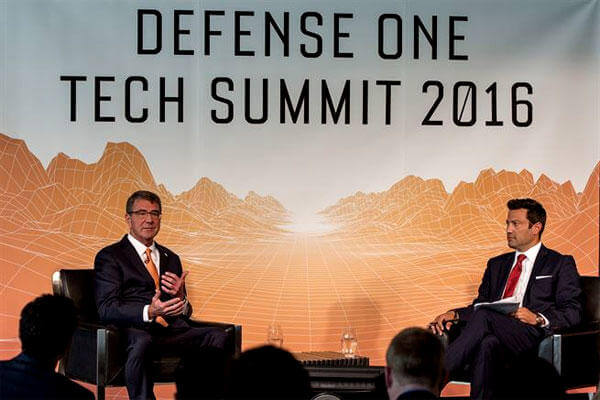Defense Secretary Ashton Carter's proposals for sweeping changes to the Pentagon's military and civilian personnel systems were likely to remain just that -- proposals -- on the limited agenda of Congress in an election year.
"We're looking forward to reviewing them" but "it's kind of late in the process to be sending these up," a House Armed Services Committee staffer said Friday on background.
The main proposals from Carter, which require congressional approval, would most likely be shelved for possible consideration next year, when a new administration and Congress will be in place, he said.
The gloomy outlook for the plan on Capitol Hill contrasted with Carter's own remarks in unveiling the proposals in a Pentagon courtyard address on Thursday.
The secretary said "we're pleased with the positive support we've seen" from lawmakers for his so-called Force of the Future initiative aimed at modernizing the Pentagon's bureaucracy along with the personnel system on promotions and career choices.
A senior defense official, speaking later on background, also said the Pentagon had received positive feedback from congressional committee leaders, though the individual would not identify them.
Carter pitched his proposals again Friday at the Defense One Tech Summit in Washington, but he agreed that reaction from Congress thus far to the personnel changes and other efforts at modernization were "mixed."
"Micro-management of the Department by Congress is not the way to go" on his personnel plan, Carter said. "We really thought hard about these things," he said, referring to the service secretaries and service chiefs. "We need to respect the collective leadership of the Department of Defense."
Carter also expressed confidence that his proposals could revive next year, even if he is no longer secretary. He would almost certainly be removed from the position if Trump is elected president, and only slightly less so if if Hillary Clinton won.
Speculation is already rampant that Clinton would choose Michelle Flournoy, the former under secretary of defense for policy, as the next defense secretary.
Carter said he was not thinking past Jan. 20, when the new president will be inaugurated.
"I'm working for President Obama," he said, but he predicted that the work behind the Force of the Future plan would have a long shelf life. "I'm confident that the ideas that we're talking about today make so much sense that they will continue," he said.
Carter's personnel proposals, including revamping the "up-or-out" promotion system for officers, would require major changes by Congress to the 1980 Defense Officer Personnel Management Act.
The current promotion system for officers "can lead to a particular assignment going to the most senior person on the list, even if someone else a bit lower down would be more effective in the job," he said.
"It also means that high-performing officers who get selected for promotion a year or two ahead of theirs peers often have to wait in line behind everyone else more senior -- sometimes for a year or more -- which prevents putting their talent to use as soon as it may be needed," he said. "It's counter-productive."
Carter said he was seeking from Congress a relaxation of the strict timelines that dictate how long an officer can stay in one rank before promotion to the next to avoid penalizing officers who decide to pursue graduate degrees or take "non-traditional" career paths. He recommended allowing the services to defer promotion boards for such officers.
On the civilian side, Carter said he was seeking authority from Congress to hire directly out of college, "and make no mistake -- this is going to be huge. I can't emphasize that enough."
Currently, when a Pentagon recruiter meets a student well-suited for a particular job, the student is referred to the USAJOBS website, he said. That can lead to 90 days of paperwork, not counting a possible security clearance, he said. To speed the process, the secretary wants the authority to make a tentative job offer to a recruit immediately.
The response from veterans organizations to Carter's plan was lukewarm at best, even from those who were willing to offer a comment.
"We'll continue to follow this but we're not taking a position," said retired Col. Jonathan Withington, public relations director of the Military Officers Association of America. "What was lacking was detail" in the proposals, he said. "There's a lot of work left to be done between Congress and the Department of Defense," he said.
A similar response came from Joe Davis, the long-time chief spokesman for the Veterans of Foreign Wars. "We're evaluating it," he said of the plan, but the organization was not ready to take a position.
"Soon this year will be over and we'll have a new administration," Davis said. It was an open question "whether all these issues will be tabled" until then, he said.
--Richard Sisk can be reached at Richard.Sisk@Military.com.
Related Video:





























